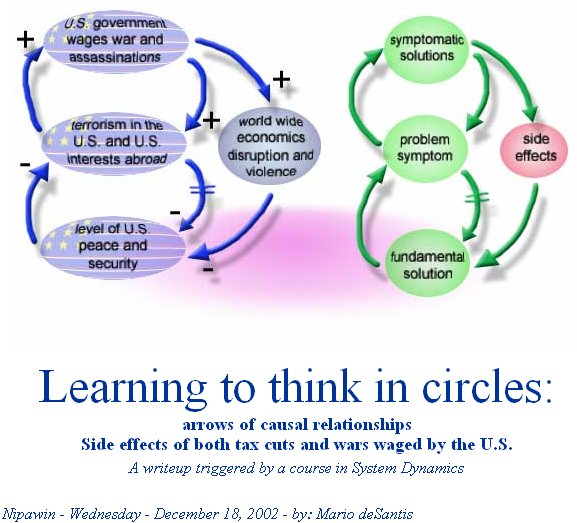Learning Stories
by
Mario deSantis
mariodesantis@hotmail.com
“I am a Canadian, free to speak without fear, free to worship in my own way, free to stand for what I think right, free to oppose what I believe wrong, and free to choose those who shall govern my country.” - -The Rt. Hon. John Diefenbaker, Canadian Bill of Rights, 1960
“The whole judicial system is at issue, it's worth more than one person.”--Serge Kujawa, Saskatchewan Crown Prosecutor, 1991
“The system is not more worth than one person's rights.”--Mario deSantis, 2002
Ensign Stories © Mario deSantis and Ensign
|
|
"Systems can't be controlled, but they can be designed and redesigned"--Dana Meadows coauthor of Limits to Growth and of Beyond the Limits to Growth We have lost our natural ability to think in circles and to understand our world we live in, and the culprits for our failure to think and be happier are the corporative businesses and their controlled governments. Today, we are supposed to be happy because the stock market has suddenly increased its value, or we are supposed to be happy because we have purchased more than we needed. What kind of thinking is this? The economic gurus tell us that we obey the equilibrium law of the demand and supply since we are rational individuals and yet I don't find any rationality for the common people as we experience a wider gap between the rich and the poor, and a wider gap between big corporative corporations and entrepreneurial corporations. Where is our equilibrium and our democracy in this neoclassical economy? The Bush administration is contemplating further tax cuts for the rich since poor and middle class people don't pay as much taxes as the rich people do. What kind of regressive reasoning is this? I tell you the name of this kind of reasoning: linear thinking, that is the inability to think in circles, the inability to understand that the results of our actions to narrow the gap between the rich and the poor have a compounding effect in furthering this same gap. Linear thinking is also found in the Bush administration's will to attack Iraq without any publicized evidence and without any knowledge of the compounding economic and violent catastrophic consequences. We must learn to think in circles, we must learn that our actions to solve our problems (gap between the situation and the goal) produce results which in turn affect our original problems as well. Thinking in circles means to analyze our world (micro-world or system); it means to find out arrows of causal relationships (or causal influences) between elements of our world; it means to find out circles (patterns) of behaviour of our world; it means to find out if such circles of behaviour have a reinforcing (positive) or balancing (negative) overall influence on the elements of our world... it means that our world can be designed and redesigned (system dynamics modeling). Note (from Sterman's Business Dynamics p.139): A positive link (arrow) means that if the cause increases, the effect increases above what it would otherwise have been, and if the cause decreases, the effect decreases below what it would otherwise have been. A negative link (arrow) means that if the cause increases, the effect decreases below what it would otherwise have been, and if the cause decreases, the effect increases above what it would otherwise have been. References García, Juan Martín Director del Area de Dinámica de Sistemas de la Cátedra UNESCO de Desarrollo Sostenible de la UPC Course on System Dynamics, http://www.ct.upc.es/catedraunesco/ads/adse.htm Weisman, Jonathan New Tax Plan May Bring Shift In Burden. Poor Could Pay A Bigger Share, (pdf) December 16, 2002, Washington Post http://www.ftlcomm.com:16080/ensign/ensign2/pdfarchive/weismanWP.pdf Meadows,Donella Dancing with Systems. What to do when systems resist change; an excerpt from Donella Meadows's unfinished last book , Whole Earth Winter 2001 http://www.wholeearthmag.com/ArticleBin/447.html Gardner, Frank Bush orders hunt for terrorists, 16 December, 2002, BBC security correspondent, http://news.bbc.co.uk/2/hi/americas/2581659.stm Baker, Dean and Weisbrot, Mark, The Economic Costs of a War in Iraq: The Negative Scenario December 9, 2002 http://www.cepr.net/Costs%20of%20war.htm |
